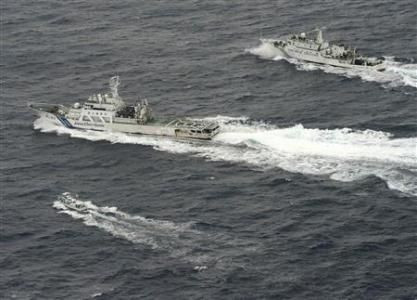Japan’s Defense White Paper Criticizes China For Threatening Regional Security

Prime Minister Shinzo Abe's government stepped up its criticism against China, on Tuesday, saying Beijing attempted to change the regional status quo by force, citing the example of China's maritime territorial claims on islands in the East China Sea, which according to Japan contradict international law.
Tensions between China, which has the second-largest defense budget in the world after the U.S., and Japan, which recently raised its defense budget for the first time in more than a decade, have escalated since last September when the Japanese government announced plans to buy three disputed islands in the East China Sea from their private owner.
“China has been broadly and rapidly modernizing its military forces,” said the annual report published by Japan’s defense ministry -- the first under Abe's government -- adding:
“These moves, together with the lack of transparency in its military affairs and security issues, are a matter of concern for the region and the international community, including Japan. It is necessary for Japan to pay utmost attention to them.”
China will boost defense spending by 10.7 percent this year, to 740.6 billion yuan ($119 billion) from 669.1 billion yuan in the previous year while Abe's government raised Japan’s defense budget in January for the first time in 11 years by 0.8 percent to 4.68 trillion yen ($51.7 billion), and pledged to improve ties with the U.S., its key ally, and other major powers in the region, including Australia and India.
The report said China’s defense budget continues to grow rapidly and has quadrupled in size over the past ten years, and accused Beijing of not disclosing information about its weapons stockpile, and its military units or their locations.
The report also took aim at North Korea and Russia for their belligerent actions, which, it said, had contributed to growing tensions in the region.
“North Korea has taken such provocative actions as its launch of the missile, which it called “Satellite” and its nuclear test... and Russia continues to intensify its military activities.”
In the past year until March 2013, Japan dispatched its fighter planes to disputed islands in the East China Sea more than 300 times in response to Chinese aircraft intruding Japan’s airspace, while Chinese surveillance ships entered Japanese waters in the vicinity of the islands 41 times between September 2012 and April 2013, the report said.
Tensions between the two countries intensified on Sept. 11, 2012, when the Japanese government announced that it had signed a contract worth $26 million to buy three of five disputed islands in the East China Sea, known as Senkaku in Japan and Diaoyu in China, from their private owner. Japan’s move stirred protests across China, where angry mobs ransacked Japanese establishments, forcing them to temporarily shut down their operations.
Chinese Foreign Ministry spokeswoman Hua Chunying criticized Japan, at a press briefing in Beijing, on Monday, before the white paper was released: “Japan has been hyping the so-called China threat and creating regional tensions to mislead international opinion. It will not help solve the issue,” Bloomberg reported.
© Copyright IBTimes 2025. All rights reserved.






















